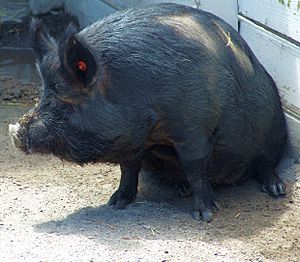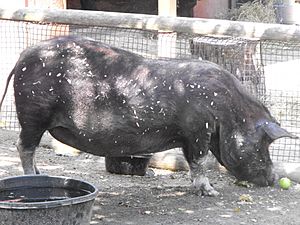Guinea hog facts for kids

A Guinea hog at the Virginia Zoological Park
|
|
| Conservation status | Rare breed |
|---|---|
| Other names |
|
| Country of origin | United States |
| Traits | |
| Weight |
|
|
|
The Guinea Hog, officially called the American Guinea Hog, is a unique type of domestic pig that first appeared in the United States. You might also hear it called the pineywoods Guinea, Guinea forest hog, acorn eater, or yard pig. Even though its name sounds like it's from the country of Guinea, it's actually not!
Scientists once thought these pigs came from West Africa. However, newer studies looking at their DNA suggest they might have come from Europe instead. Some believe the American Guinea Hog is related to a pig breed called the Improved Essex, which doesn't exist anymore. Guinea Hogs are quite rare. They have a shiny black coat, a strong body, a curly tail, and ears that stand straight up.
You can find two main kinds of Guinea Hogs in North America. Some have smaller bones, while others have larger bones and longer legs. There's also a type of Guinea Hog found in South America.
History of the Guinea Hog

The name "Guinea" for these pigs doesn't actually mean they came from the country of Guinea. Instead, it likely meant "small," just like "Guinea Cattle" are a smaller type of cow. The original African Guinea hogs were actually large, red pigs with bristly hair and long tails. They were brought to America on slave ships a long time ago.
Around 1804, Thomas Jefferson, who later became a U.S. President, got some of these pigs. They had traveled from Africa through the Canary Isles. These first pigs were mostly black but had a hint of red, so people called them "red Guineas." Sadly, this original red strain of pigs is now extinct.
Later, these pigs were bred with other types of pigs, like Appalachian English pigs and Essex pigs. This mixing created the new breed we know today as the American Guinea Hog. These new pigs kept their black color but lost the reddish tint. Sometimes, they are simply called "black Guineas."
These pigs were very popular with farmers who grew just enough food for themselves and their families. This was because Guinea Hogs were great at finding their own food. They also had a special habit of eating snakes, which made farmyards safer for children and other farm animals!
After about 1880, the Guinea Hog became less popular. For a while, it was in danger of disappearing completely. The exact connection between the extinct red Guinea and the American Guinea Hog isn't fully clear. We also don't know exactly how much of other pig breeds are in their background. However, we know they are related because sometimes a reddish pig is born to American Guinea Hog parents, who are usually bluish-black.
It's thought that there might have been several different types of American Guineas in the past. To help save this special breed, the American Guinea Hog Association was started in 2005. This group works hard to make sure these pigs continue to exist. The Guinea Hog is also part of Slow Food USA's Ark of Taste. This is a list of important heritage foods that are in danger of disappearing.
For many years, the Chicago Lincoln Park Zoo was home to several Guinea Hogs.
Guinea Hogs as Pets
Guinea Hogs are one of several smaller pig breeds that people sometimes keep as pets. While they are not as common as Potbelly pigs or Kunekune pigs, they can make interesting companions.
 | Delilah Pierce |
 | Gordon Parks |
 | Augusta Savage |
 | Charles Ethan Porter |

